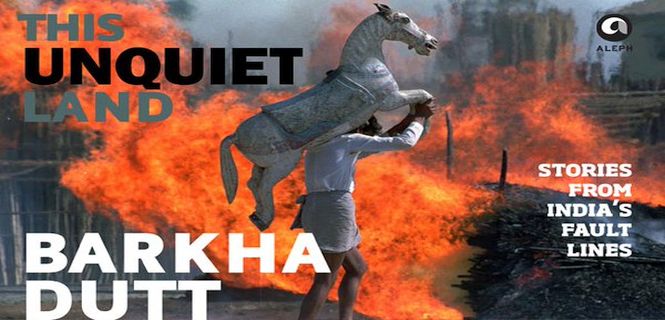Image may be NSFW.
Clik here to view.
Clik here to view.

Presuming that she is a fan of Bollywood, Barkha Dutt may have heard of Raj Kumar's advice for those living in glass houses: Never throw stones at others.
But, this is exactly what the journalist seems to have attempted in her debut book, This Unquiet Land — Stories from India’s Fault Lines.
In her as-yet-unreleased book, Dutt has claimed that while Narendra Modi and Nawaz Sharif were sulking at the 2014 Saarc Summit in Kathmandu in front of cameras, off it they had an hour-long meeting, arranged by Indian steel magnate Sajjan Jindal, the brother of former Congress MP Naveen Jindal.
Modi called up Jindal from Nepal and asked him to take the earliest flight to the Nepali capital. “Jindal was asked to discreetly reach out to his ‘friend’ across the border,” writes Dutt. The two leaders then met quietly “in the privacy of Jindal’s hotel room”, where they spent an hour together, says a Hindustan Times report that claims exclusive access to the book.
Modi – hinting at the upcoming Jammu and Kashmir elections – indicated while he was keen, “circumstances” did not permit him to reopen formal channels. Sharif spoke about “constrictions” imposed on him by the security establishment and how his “negotiating power with the army had been gradually whittled away”.
Prima facie, the revelation, if true, reminds us that when it comes to India-Pakistan diplomacy, like the elephant's proverbial tusks, the optics are different from what goes behind the veil of posturing. While the gullible public is fed a cocktail of lies and jingoistic rhetoric meant to foster animus, behind the smokescreen of hostility politicians smoke their peace pipes and empathise with each other's domestic compulsions. Obviously, a frosty handshake is just a cover for the friendly jhappi behind closed doors.
That more is hidden from the real stakeholders than what is revealed.
But, isn't Dutt herself guilty of the same subterfuge? If Sharif and Modi are guilty of holding back information, isn't the journalist, whose job is to bring it into the public domain, complicit in the conspiracy because of her opportunistic silence? In Twitter conversation sparked by the Hindustan Times teaser for her book release, Barkha has said the ‘exclusive’ about the secret Modi-Sharif meeting was hers (and that the paper was quoting from her book).
The SAARC Summit was held in Kathmandu exactly a year ago. If Dutt was privy to the secret meeting, why did she not act in a manner expected of a journalist, which is to break the news on the TV channel she represents? Perhaps, the lure of keeping it for her forthcoming book may have overridden any moral and ethical temptation for sharing the story with her TV audience. After all, a story just generates ephemeral TRPs, but a trans-border controversy can turn a book into a bestseller.
When her name was linked with the Neera Radia tapes, Dutt was accused of sitting on a national scoop on how a corporate lobbyist was trying to fix appointments to the Union Cabinet. She then defended herself by saying maybe she didn’t see a story in it. But now, with this admission that she had this ‘exclusive’ information that Modi-Sharif’s meeting was anything but frosty, she could be accused of sitting on a story. The fact that she included it in her book suggests she was aware of the merit of the story? So was she sitting on it for her book?
With the publicity Barkha’s best-kept secret of the secret meeting has generated, the sales of the book will probably spike.
But, as a viewer who tunes in to NDTV, I would be more concerned about the sellout for a bestseller.